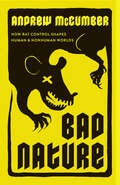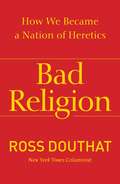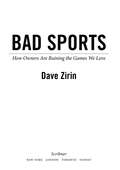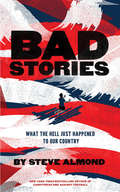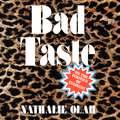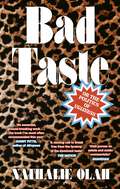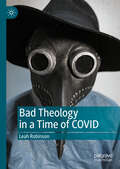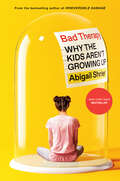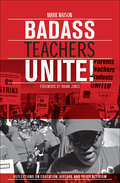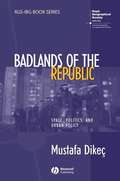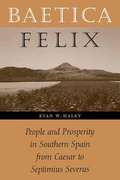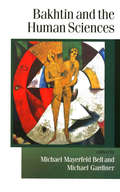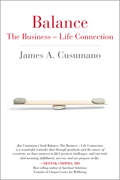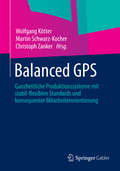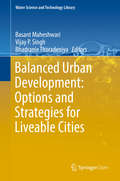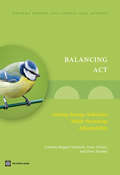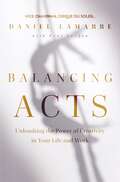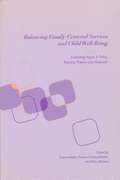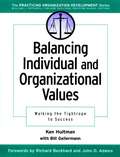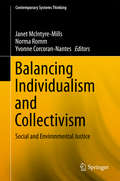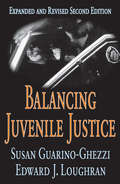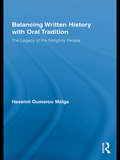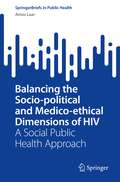- Table View
- List View
Bad Nature: How Rat Control Shapes Human and Nonhuman Worlds
by Andrew McCumberOffers insights into the social and cultural implications of humans’ relationships with rats and the natural world. Apart from the occasional pet owner who has rats, most people regard rats as disease-carrying nocturnal pests, scurrying around dumpsters and dragging slices of pizza through New York City subways. Since rats are seemingly omnipresent in human life, why do we harbor such negative feelings about them, and why are they among the creatures most frequently targeted for systematic extermination? In Bad Nature, sociologist Andrew McCumber draws out the cultural underpinnings of rat extermination across three countries and two continents. Drawing from ethnographic, interview, and textual data from the frigid prairie of Alberta, Canada; the heart of downtown Los Angeles, California; and the iconic Galápagos Islands of Ecuador, McCumber studies how humans have sought to suppress and exterminate rat populations in a variety of environmental, social, and political situations. He shows how, in these disparate locations, rat control is a social practice that draws and clarifies the spatial and symbolic boundaries between “good” and “bad” forms of nature. Rats are near the bottom of a symbolic hierarchy of species that places human life at the top, companion animals and majestic wildlife just below them, and the “invasive species” that call for systematic extermination at the very bottom. This hierarchy of living things that places rats at the bottom, McCumber argues, mirrors human systems of social inequalities and power dynamics. Both original and engaging, Bad Nature urges readers to consider, when charting a just and sustainable future, where will the rats be placed in the worlds we envision?
Bad Religion: How We Became a Nation of Heretics
by Ross DouthatAs the youngest-ever op-ed columnist for the New York Times, Ross Douthat has emerged as one of the most provocative and influential voices of his generation. In Bad Religion he offers a masterful and hard-hitting account of how American Christianity has gone off the rails—and why it threatens to take American society with it. Writing for an era dominated by recession, gridlock, and fears of American decline, Douthat exposes the spiritual roots of the nation’s political and economic crises. He argues that America’s problem isn’t too much religion, as a growing chorus of atheists have argued; nor is it an intolerant secularism, as many on the Christian right believe. Rather, it’s bad religion: the slow-motion collapse of traditional faith and the rise of a variety of pseudo-Christianities that stroke our egos, indulge our follies, and encourage our worst impulses. These faiths speak from many pulpits—conservative and liberal, political and pop cultural, traditionally religious and fashionably “spiritual”—and many of their preachers claim a Christian warrant. But they are increasingly offering distortions of traditional Christianity—not the real thing. Christianity’s place in American life has increasingly been taken over, not by atheism, Douthat argues, but by heresy: debased versions of Christian faith that breed hubris, greed, and self-absorption. In a story that moves from the 1950s to the age of Obama, he brilliantly charts institutional Christianity’s decline from a vigorous, mainstream, and bipartisan faith—which acted as a “vital center” and the moral force behind the civil rights movement—through the culture wars of the 1960s and 1970s to the polarizing debates of the present day. Ranging from Glenn Beck to Barack Obama, Eat Pray Love to Joel Osteen, and Oprah Winfrey to The Da Vinci Code, Douthat explores how the prosperity gospel’s mantra of “pray and grow rich,” a cult of self-esteem that reduces God to a life coach, and the warring political religions of left and right have crippled the country’s ability to confront our most pressing challenges and accelerated American decline. His urgent call for a revival of traditional Christianity is sure to generate controversy, and it will be vital reading for all those concerned about the imperiled American future.
Bad Sports
by Dave ZirinA THOUGHT-PROVOKING LOOK AT THE BIG BUSINESS AND IMMORAL PRACTICES BEHIND PROFESSIONAL SPORTS BY ACCLAIMED SPORTSWRITER DAVE ZIRIN, HAILED AS THE "CONSCIENCE OF AMERICAN SPORTSWRITING" (THE WASHINGTON POST )The fastest-growing sector of today's sports audience is the alienated fan. Complaints abound: from inflated ticket prices, $6 hot dogs, and $9 beers to owners endlessly demanding new multimillion-dollar stadiums funded by public tax dollars. Those sitting in the owners' boxes are increasingly placing profit over players' performances and fan loyalty. Bad Sports cuts through the hype and bombast to zero in on tales of abusive, dictatorial owners who move their teams thousands of miles away from their fan base, use their stadiums as religious and political platforms, or hold communities ransom for millions of dollars of taxpayer money to fund their gargantuan stadiums.As the multibillion-dollar sports-industrial complex continues to lumber along, Dave Zirin is the voice in the wilderness, speaking out for the common fan with a tough, passionate, and intelligent voice that will remind readers that there is more to sportswriting than glowing athlete profiles.
Bad Stories: What the Hell Just Happened to Our Country
by Steve Almond&“Almond draws on everything from The Grapes of Wrath to the voting practices of his babysitter to dismantle the false narratives about American democracy.&” —Cheryl Strayed, international-bestselling author of Wild Like a lot of Americans, Steve Almond spent the weeks after the 2016 election lying awake, in a state of dread and bewilderment. The problem wasn&’t just the election, but the fact that nobody could explain, in any sort of coherent way, why America had elected a cruel, corrupt, and incompetent man to the Presidency. Bad Stories: What the Hell Just Happened to Our Country is Almond&’s effort to make sense of our historical moment, to connect certain dots that go unconnected amid the deluge of hot takes and think pieces. Almond looks to literary voices—from Melville to Orwell, from Bradbury to Baldwin—to help explain the roots of our moral erosion as a people. The book argues that Trumpism is a bad outcome arising directly from the bad stories we tell ourselves. To understand how we got here, we have to confront our cultural delusions: our obsession with entertainment, sports, and political parody, the degeneration of our free press into a for-profit industry, our enduring pathologies of race, class, immigration, and tribalism. Bad Stories is a lamentation aimed at providing clarity. It&’s the book you can pass along to an anguished fellow traveler with the promise, This will help you understand what the hell happened to our country. &“Almond holds up literature as a guide through America&’s age-old moral dilemmas and finds hope for his country in family, forgiveness, and political resistance.&” —Booklist
Bad Taste: Or the Politics of Ugliness
by Nathalie OlahA bold and original exploration from a renowned radical thinker, exploring the consequences of our obsession with image and taste.This is not a taste, nor an anti-taste, manual. This is an interrogation of the importance we place on seemingly objective ideas of taste in a culture that is saturated by imagery, and the dangerous impact this has on our identities, communities and politics. This book is dedicated to understanding the industries of taste. From the food we eat to the way we spend our free time, Olah exposes the shallow waters of 'good' and 'bad' taste and the rigid hierarchies that uphold this age-old dichotomy. -How did minimalism become a virtue, and who can afford to do it justice?When did blue-collar jackets become a fashion item?Who stands to gain from the distinction made between beauty, and sex?- Bold, original and provocative, Bad Taste is a revelatory exploration of the intersection between consumerism, class, desire and power, and a rousing call-to-arms to break free from the restrictive ways we see those around us.(P) 2023 Little Brown Book Group Limited for and on behalf of Dialogue Books
Bad Taste: Or the Politics of Ugliness
by Nathalie OlahA timely critique of consumer culture which captures this image-obsessed moment in history, perfect for fans of Zadie Smith's Feel Free and Jia Tolentino's Trick Mirror.This book is not a taste, nor an anti-taste, manual. This is an interrogation of the importance we place on seemingly objective ideas of taste in a culture that is saturated by imagery, and the dangerous impact this has on our identities, communities and politics. This book is dedicated to understanding the industries of taste. From the food we eat to the way we spend our free time, Olah exposes the shallow waters of 'good' and 'bad' taste and the rigid hierarchies that uphold this age-old dichotomy. -How did minimalism become a virtue, and who can afford to do it justice?When did blue-collar jackets become a fashion item?Who stands to gain from the distinction made between beauty, and sex?- Bold, original and provocative, Bad Taste is a revelatory exploration of the intersection between consumerism, class, desire and power, and a rousing call-to-arms to break free from the restrictive ways we see those around us.
Bad Theology in a Time of COVID
by Leah RobinsonIn this book, Leah E. Robinson discusses the Covid-19 pandemic as it was viewed in the theological community, both professionally and politically. Robinson explores the ways in which the misuse of various Christian theological doctrines have led to and perpetuated social ills. She begins by first defining her criteria for “bad” versus “good” theology, and then investigates the ways in which the handling of the Covid pandemic has provided damaging examples of “bad” theology. The book gives a voice to those who are trying to guide people towards scientific logic and good health, while simultaneously using the lens of Christian leadership.
Bad Therapy: Why the Kids Aren't Growing Up
by Abigail ShrierFrom the author of Irreversible Damage, an investigation into a mental health industry that is harming, not healing, American children. <p><>p> In virtually every way that can be measured, Gen Z’s mental health is worse than that of previous generations. Youth suicide rates are climbing, antidepressant prescriptions for children are common, and the proliferation of mental health diagnoses has not helped the staggering number of kids who are lonely, lost, sad and fearful of growing up. What’s gone wrong with America’s youth? <p><>p> In Bad Therapy, bestselling investigative journalist Abigail Shrier argues that the problem isn’t the kids—it’s the mental health experts. Drawing on hundreds of interviews with child psychologists, parents, teachers, and young people, Shrier explores the ways the mental health industry has transformed the way we teach, treat, discipline, and even talk to our kids. She reveals that most of the therapeutic approaches have serious side effects and few proven benefits. Among her unsettling findings: <p><>p> Talk therapy can induce rumination, trapping children in cycles of anxiety and depression Social Emotional Learning handicaps our most vulnerable children, in both public schools and private “Gentle parenting” can encourage emotional turbulence – even violence – in children as they lash out, desperate for an adult in charge. <p><>p> Mental health care can be lifesaving when properly applied to children with severe needs, but for the typical child, the cure can be worse than the disease. Bad Therapy is a must-read for anyone questioning why our efforts to bolster America’s kids have backfired—and what it will take for parents to lead a turnaround. <p> <b>New York Times Bestseller</b>
Bad Time Stories
by Charles Keim Yonatan ReshefThe 1990s and 2000s were especially difficult decades for government-public sector union relations in Canada. Rising costs and growing debts meant that governments were on the lookout for savings, and public sector unions and employees were easy targets for government actions. Bitter conflicts between unions and governments erupted and each labour dispute involved numerous rounds of public rhetoric in which both sides attempted to justify their actions and stigmatize their opponents.In Bad Time Stories, Yonatan Reshef and Charles Keim analyse the language of both parties in order to identify the legitimation strategies at work during government-union conflict. The authors use evidence drawn from newspapers, speeches, parliamentary transcripts, and legal statements in presenting a new framework for understanding the discursive strategies employed by governments and unions in labour disputes.Using a case study and linguistic approach, Bad Time Stories offers a unique perspective on industrial relations and will be of interest to scholars in the areas of business, public policy, and communications, as well to those directly involved in union-management negotiations.
Badass Teachers Unite!: Reflections on Education, History, and Youth Activism
by Mark NaisonAn academic exposes how dominant education reform policies destabilize low-income communities.In this incisive collection of essays, educator and activist Mark Naison draws on years of research on Bronx history and his own experience on the front lines of the education wars to unapologetically defend teachers and students from education “reform” policies that undermine their power and creativity.Naison shows how dominant education policy systematically hurts the very children it claims to support and instead forces them to “race to the top.” He exposes the Duncans, Rhees, and Gateses for schemes that intensify racial and economic inequality. And he refocuses the conversation on teaching and organizing strategies that should be implemented in communities everywhere.Praise for Badass Teachers Unite!“Mark Naison has woven a series of provocative essays into a powerful book. No traditional scholarly treatise, Badass Teachers Unite! is an education manifesto for the people’s school reform movement. With clarity, verve, and passion, Naison outlines the challenges we face in transforming public schools and he forges a guide to our actions. This book is must reading for anyone concerned about the plight of public schools in the USA today.” —Henry Louis Taylor Jr., director, UB Center for Urban Studies, University at Buffalo“Mark Naison is a badass?and it took one to write this rousing pronouncement to the militancy emerging among today’s schoolteachers . . . . Mark Naison’s Badass Teachers Unite! brings back the attitude we need to confront the corporate reform bullies and reclaim our schools.” —Jesse Hagopian, history teacher, Garfield High School, Seattle, Washington, and associate editor for Rethinking Schools magazine
Badlands of the Republic: Space, Politics and Urban Policy (RGS-IBG Book Series #78)
by Mustafa DikecThe relationship between space and politics is explored through a study of French urban policy. Drawing upon the political thought of Jacques Rancière, this book proposes a new agenda for analyses of urban policy, and provides the first comprehensive account of French urban policy in English. Essential resource for contextualizing and understanding the revolts occurring in the French ‘badland’ neighbourhoods in autumn 2005 Challenges overarching generalizations about urban policy and contributes new research data to the wider body of urban policy literature Identifies a strong urban and spatial dimension within the shift towards more nationalistic and authoritarian policy governing French citizenship and immigration
Baetica Felix: People and Prosperity in Southern Spain from Caesar to Septimius Severus
by Haley Evan W.Baetica, the present-day region of Andalusia in southern Spain, was the wealthiest province of the Roman Empire. Its society was dynamic and marked by upward social and economic mobility, as the imperial peace allowed the emergence of a substantial middle social and economic stratum. Indeed, so mutually beneficial was the imposition of Roman rule on the local population of Baetica that it demands a new understanding of the relationship between Imperial Rome and its provinces. Baetica Felix builds a new model of Roman-provincial relations through a socio-economic history of the province from Julius Caesar to the end of the second century A.D. Describing and analyzing the impact of Roman rule on a core province, Evan Haley addresses two broad questions: what effect did Roman rule have on patterns of settlement and production in Baetica, and how did it contribute to wealth generation and social mobility? His findings conclusively demonstrate that meeting the multiple demands of the Roman state created a substantial freeborn and ex-slave "middle stratum" of the population that outnumbered both the super-rich elite and the destitute poor.
Bakhtin and the Human Sciences: No Last Words (Published in association with Theory, Culture & Society)
by Michael E. Bell Michael GardinerBakhtin and the Human Sciences demonstrates the abundance of ideas Bakhtin's thought offers to the human sciences, and reconsiders him as a social thinker, not just a literary theorist. The contributors hail from many disciplines and their essays' implications extend into other fields in the human sciences. The volume emphasizes Bakhtin's work on dialogue, carnival, ethics and everyday life, as well as the relationship between Bakhtin's ideas and those of other important social theorists. In a lively introduction Gardiner and Bell discuss Bakhtin's significance as a major intellectual figure and situate his ideas within current trends and developments in social theory.
Balance
by James A. CusumanoJames Cusumano has led many lives. Implementing his success as an entertainer, scientist, corporate executive, and entrepreneur as a template, Cusumano shares his multifaceted guide to success, personal fulfillment, and balance. This easy-to-follow, autobiographical guidebook, Balance: The BusinessOCoLife Connection, instructs readers in methods whic"
Balanced GPS: Ganzheitliche Produktionssysteme mit stabil-flexiblen Standards und konsequenter Mitarbeiterorientierung
by Wolfgang Kötter Martin Schwarz-Kocher Christoph ZankerBei der Einführung von Ganzheitlichen Produktionssystemen (GPS) steht bislang die Standardisierung und Vereinheitlichung von Arbeitsmethoden und Arbeitsabläufen im Vordergrund. Dies zeigt sich sowohl in der betrieblichen Praxis als auch in der wissenschaftlichen Diskussion rund um GPS. Die Autoren entwickeln GPS zu einem Managementsystem weiter, mit dem zum einen die Balance von Flexibilität und Stabilität gezielt gefördert wird und zum anderen die Beschäftigten aktiv einbezogen, ihre Kompetenzen genutzt und ihre berechtigten Anliegen angemessen berücksichtigt werden. Damit wird ein völlig neuartiger Prozess zur Herstellung von arbeitspolitischer Balance im Unternehmen vorgestellt. Neben der Darstellung eines Lernprogramms für produktionsnahe Führungskräfte zur Sozial-, Kommunikations- und Konfliktkompetenz enthält das Buch auch neue Ansätze zur strategieorientierten Planung von Ganzheitlichen Produktionssystemen. Die Erkenntnisse sind anschaulich in Fallbeispielen dargestellt und vielfach um Leitlinien und Checklisten zur leichteren Umsetzung der Erkenntnisse in die Praxis ergänzt.
Balanced Scorecard Success: The Kaplan-Norton Collection (4 Books)
by Robert S. Kaplan David P. NortonThis collection highlights the most important ideas and concepts from Robert S. Kaplan and David P. Norton, authors of The Balanced Scorecard, a revolutionary performance measurement system that allows organizations to quantify intangible assets such as people, information, and customer relationships. Also included are Strategy Maps, which enables companies to describe the links between intangible assets and value creation with a clarity and precision never before possible; The Execution Premium, which describes a multistage system to help companies to gain measurable benefits from carefully formulated business strategy; and The Strategy-Focused Organization, which introduces a new approach to make strategy a continuous process owned not just by top management, but by everyone.
Balanced Urban Development: Options and Strategies for Liveable Cities (Water Science and Technology Library #72)
by Vijay P. Singh Basant Maheshwari Bhadranie ThoradeniyaThis book provides a unique synthesis of concepts and tools to examine natural resource, socio-economic, legal, policy and institutional issues that are important for managing urban growth into the future. The book will particularly help the reader to understand the current issues and challenges and develop strategies and practices to cope with future pressures of urbanisation and peri-urban land, water and energy use challenges. In particular, the book will help the reader to discover underlying principles for the planning of future cities and peri-urban regions in relation to: (i) Balanced urban development policies and institutions for future cities; (ii) Understanding the effects of land use change, population increase, and water demand on the liveability of cities; (iii) Long-term planning needs and transdisciplinary approaches to ensure the secured future for generations ahead; and (iv) Strategies to adapt the cities and land, water and energy uses for viable and liveable cities. There are growing concerns about water, food security and sustainability with increased urbanisation worldwide. For cities to be liveable and sustainable into the future there is a need to maintain the natural resource base and the ecosystem services in the peri-urban areas surrounding cities. This need is increasing under the looming spectre of global warming and climate change. This book will be of interest to policy makers, urban planners, researchers, post-graduate students in urban planning, environmental and water resources management, and managers in municipal councils.
Balancing Act: Cutting Energy Subsidies while Protecting Affordability
by Caterina Ruggeri Laderchi Anne Olivier Chris TrimbleIn Eastern Europe and Central Asia there are significant pressures for residential energy tariffs to rise, as government budgets are increasingly stretched and cannot afford to pay large energy subsidies. Further pressures for tariffs to rise come from environmental concerns, as the tariff levels that households now face do not cover the social costs of energy production. Because reforms that would increase energy tariffs are likely to affect significantly the poor and the middle class, their political feasibility may be questioned unless appropriate ways of cushioning the impacts can be devised. Balancing these competing claims-fiscal and environmental concerns on the one hand, affordability and political economy concerns on the other-is a task that policy makers in the region are increasingly unable to put off. While challenging, the reforms needed for this balancing act can build on much that has been learned in the last decade in terms of improving the effectiveness of social assistance systems and increasing energy efficiency. This report suggests that a policy agenda that focuses on cutting subsidies to the energy sector, while investing in energy efficiency and supporting households at the bottom of the distribution, amounts to a new wave of policy reforms for the energy sector in transition countries. The feasibility of such an integrated policy agenda and the ability of these policies to balance the competing claims of fi scal responsibility and social concerns are explored through different policy scenarios, which, in their simplicity, help clarify the parameters of the policy choices many countries ECA are facing. This report is a part of a series of 3 regional reports. The series includes Growing green: The economic benefits of climate action in Europe and Central Asia, Balancing act: Cutting energy subsidies and protecting affordability and Lessons learned from energy efficiency success cases.
Balancing Acts: Unleashing the Power of Creativity in Your Life and Work
by Daniel LamarreAre you prepared to take the risks necessary to drive innovation and champion an environment of over-the-top invention? Cirque du Soliel CEO Daniel Lamarre shares what it takes for anyone, regardless of position or industry, to embrace the value of creative leadership.At the core of Cirque du Soliel&’s lavish, multi-million-dollar productions is President and CEO Daniel Lamarre, who has mastered the ability to bring business and creativity together across multiple languages and cultures in a way that has never been seen before. The secrets he shares in Balancing Acts are rooted in tremendous faith in your own creative skills and those of the sharpest minds within your organization.Through Daniel&’s story triumph and trials, you&’ll learn:How to shatter the perceived limitations standing in the way of your ability to think creatively and innovatively;When to step up and when to step back so that your team can create a masterpiece that doesn&’t break the bank;How, in using the methods Daniel has uncovered, modern companies with entrenched bureaucracies can bring creativity and business together to foster innovation and boost profits; andHow to use creative thinking to lead your organization to new heights.Whether you work for one of the most creative organizations on the planet like Cirque du Soleil; in a stuffy corporate job; or somewhere in between—Balancing Acts is filled with principles that can strengthen and accelerate any business on the planet.
Balancing Family-Centered Services and Child Well-Being: Exploring Issues in Policy, Practice, Theory and Research
by Marc Mannes Elaine Walton Patricia Sandau-BecklerWith contributions ranging from academic and professional theorists and policy developers to independent social workers, this book explores the development of family-centered services, the processes by which these services are implemented, the problems the field now faces, and prospects for the future. Multi-faceted examinations of the field show how family-centered services and child well-being can be linked on a daily basis to better the lives of both parents and children.
Balancing Individual and Organizational Values: Walking the Tightrope to Success
by Ken Hultman Bill GellermannCreate a healthy and successful organization environment! It s time to re-examine your organization s fundamental values and create the conditions necessary to make your workplaces healthier environments for everyone. This essential resource is filled with critical information needed to understand the interrelationship between individual and organizational values. Balancing Individual and Organizational Values: * Explores the major value challenges in today s business world * Offers powerful tools for assessing values * Outlines a systematic approach for revitalizing organizations through growth values
Balancing Individualism and Collectivism: Social and Environmental Justice (Contemporary Systems Thinking)
by Norma Romm Janet Mcintyre-Mills Yvonne Corcoran-NantesThis book addresses the social and environmental justice challenge to live sustainably and well. It considers the consequences of our social, economic and environmental policy and governance decisions for this generation and the next. The book tests out ways to improve representation, accountability and re-generation. It addresses the need to take into account the ethical implications of policy and governance decisions in the short, medium and long term based on testing out the implications for self, other and the environment. This book recognizes the negative impact that humans have had on the Earth's ecosystem and recommends a less anthropocentric way of looking at policies and governance. The chapters discuss the geologic impact that people have had on the globe, both positive and negative, and brings awareness to the anthropocentric interventions that have influenced life on Earth during the Holocene era. Based on these observations, the authors discuss original ideas and critical reviews on ways to govern those who interpret the world in terms of human values and experience, and to conduct an egalitarian lifestyle. These ideas address the growing rise in the size of the ecological footprints of some at the expense of the majority, the growth in unsustainable food choices and of displaced people, and the need for a new sense of relationship with nature and other animals, among other issues. The chapters included in Balancing Individualism and Collectivism: Social and Environmental Justice encourage readers to challenge the sustainability agenda of the anthropocentric life. Proposed solutions to these unsustainable actions include structuralized interventions and volunteerism through encouragement and education, with a focus on protecting current and future generations of life through new governmental etiquette and human cognizance.
Balancing Juvenile Justice
by Susan Guarino-GhezziThe juvenile justice system in the United States has become a detrimental rather than a remedial experience, one that often reinforces youths' defiance of authority. Trying juveniles as adults, overcrowding juvenile detention facilities, and other factors have led to the deterioration of a system whose original intent was to protect immature youngsters who might get arrested for truancy or joyriding. The present system is ill equipped to cope with today's children who may be arrested for violent crimes such as rape and murder. This has led to an intense pessimism. Balancing Juvenile Justice, now in an expanded, revised edition, is a comprehensive discussion of the primary considerations policymakers should use in striking a balance between holding youths responsible for past behavior, and providing services and opportunities so that their future behavior will be guided by constructive, rather than destructive, forces. The topics covered include: trends in philosophy and politics; a review of state and local reforms in juvenile justice; the changing role of the juvenile court; development of a balanced continuum of correctional programs; and strategies for reform. The authors emphasize that while juvenile offenders should pay for their crimes, it is equally urgent to realize that adult neglect, abuse, rescinding needed resources, and stigmatizing of youth will only ensure that crime and criminal justice become permanent distinguishing features of the United States. This new edition of Balancing Juvenile Justice will be compelling reading for sociologists, criminologists, juvenile justice practitioners, and policymakers.
Balancing Written History with Oral Tradition: The Legacy of the Songhoy People (African Studies)
by Hassimi Oumarou MaigaBy balancing written history with the African oral tradition, this book conceptualizes the integrations among diverse peoples of Africa and specifically among the Songhoy people. Drawing from a number of academic disciplines and original research that documents the oral and literate traditions of the Songhoy people, Hassimi Oumarou Maiga offers a unique interpretation of indigenous Songhoy-African perspectives on African history, culture and education from antiquity to the present day and from continental Africa to the worldwide African Diaspora. In explaining the cosmology, philosophy, values and process of indigenous, non-Muslim education, this book also corrects and balances the perception of the Songhoy as a wholly Muslim society. The legacy of the Songhoy Empire, Maiga argues, is as a model of African integration through its administrative and political organization, which remains relevant even today. This book is an essential addition for scholars and students of African history.
Balancing the Socio-political and Medico-ethical Dimensions of HIV: A Social Public Health Approach (SpringerBriefs in Public Health)
by Amos LaarResponding to public health challenges at the global and local levels can give rise to an array of tensions. To assure sustainable public health, these tensions need to be meaningfully balanced. Using empirical evidence and lived experiences relating to HIV from the global south, this book enunciates the many dimensions of national-level responses to HIV/AIDS including conceptual, philosophical, and methodological perspectives from public health, public policy, bioethics, and social sciences. Calling out glaring neglects, the book makes a bold recommendation for the destabilization of the naturalness with which national HIV/AIDS responses ignore the socio-political and medico-ethical dimensions of HIV. The case made is grounded in the philosophy of social public health. Such a critical perspective is not unique to Ghana’s response to HIV/AIDS but serves as emblematic voice for similarly situated settings of the global south. The book is also timely. It is written at a time when public health actors are repositioning themselves to be competent users of not only pharmaceutic vaccines, but also social vaccines. Topics explored in the chapters include:Public health approaches to HIV and AIDSAccess to life-saving public health goods by persons infected or affected by HIV“They are criminals”: AIDS, the law, harm reduction, and the socially excludedDeveloping socially and ethically responsive National AIDS policiesBalancing the Socio-political and Medico-ethical Dimensions of HIV: A Social Public Health Approach is compelling reading for a broad spectrum of readers. The book will appeal to professionals, scholars, and students in public health, public policy, bioethics, and social sciences, as well as medical anthropologists, sociologists, and global health scholars. Public health economists, lay politicians, and civil society organizations advocating for health equity will find the book useful as well.
